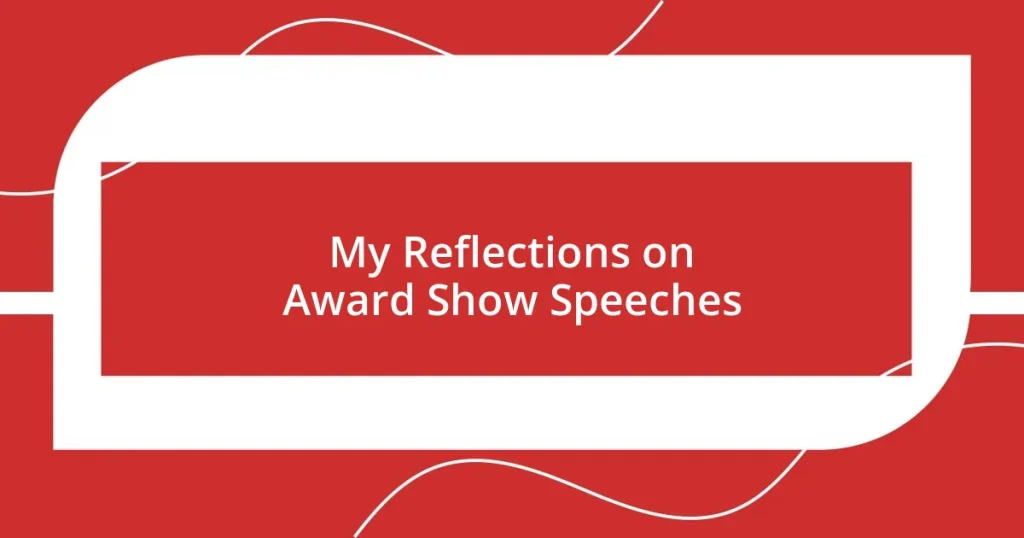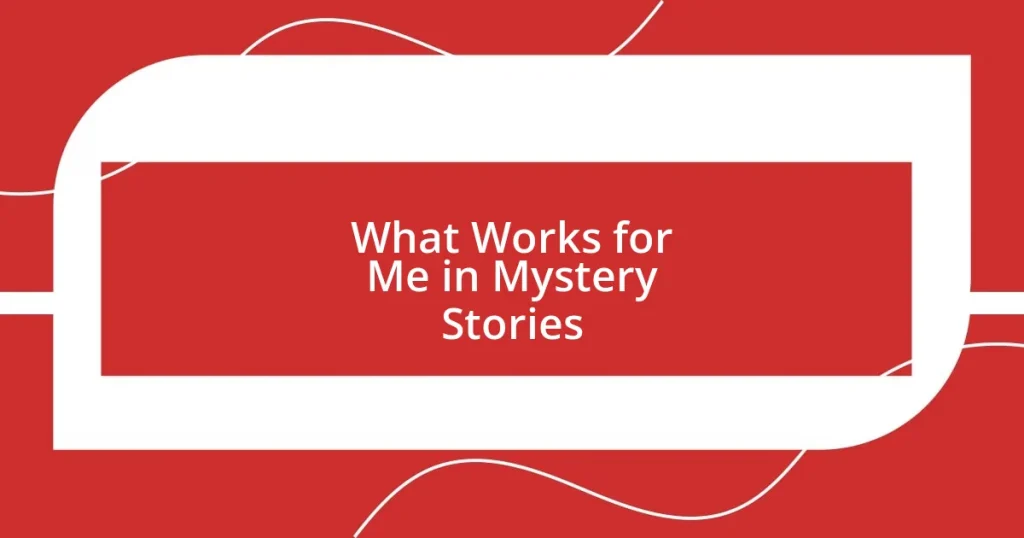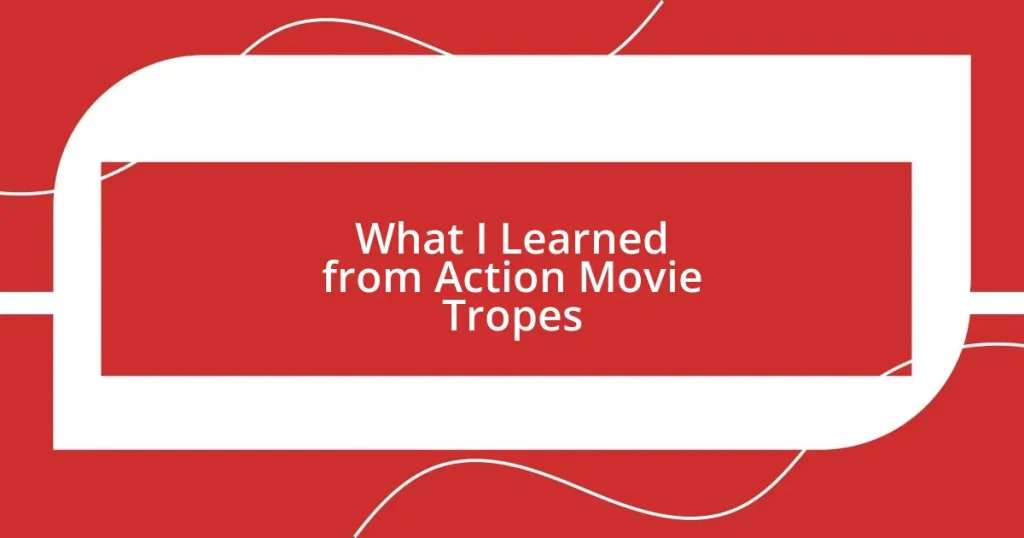Key takeaways:
- Award speeches are a blend of personal storytelling and emotional connection, often highlighting themes of gratitude, resilience, and community.
- Effective delivery, including tone and body language, enhances the impact of a speech, making it memorable and relatable to the audience.
- Key elements of great speeches include authenticity, strong openings/closings, and the ability to provoke thought through rhetorical questions.
- Personal stories create empathy and understanding, turning speeches into powerful communal experiences that inspire reflection and action.
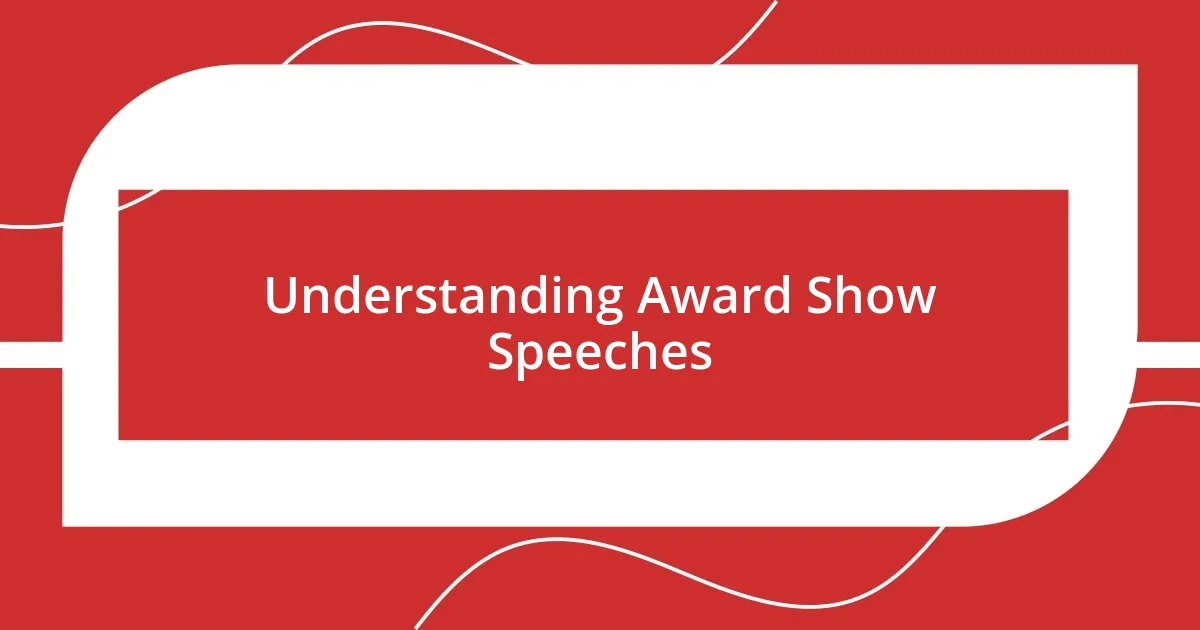
Understanding Award Show Speeches
Award show speeches serve as a fascinating reflection of the individual delivering them. I often find myself captivated by the emotions that spill forth from winners during these moments. For instance, I remember a speech where the winner expressed gratitude towards their family, a sentiment that resonated deeply with me, reminding us all of the personal sacrifices behind success.
These speeches vary greatly in tone and content, creating a unique tapestry of human experience. Have you ever noticed how some winners choose to focus on social issues while others share humorous anecdotes? I once heard a speech that perfectly balanced comedy with a heartfelt message about mentorship, making me realize the power of storytelling in connecting with audiences.
Ultimately, award show speeches are more than just industry recognition; they’re an opportunity for reflection and inspiration. I think about the times when I’ve felt compelled to share my journey with others, and it strikes me how such platforms can amplify voices and inspire change. Don’t you think that’s what makes these moments truly special?
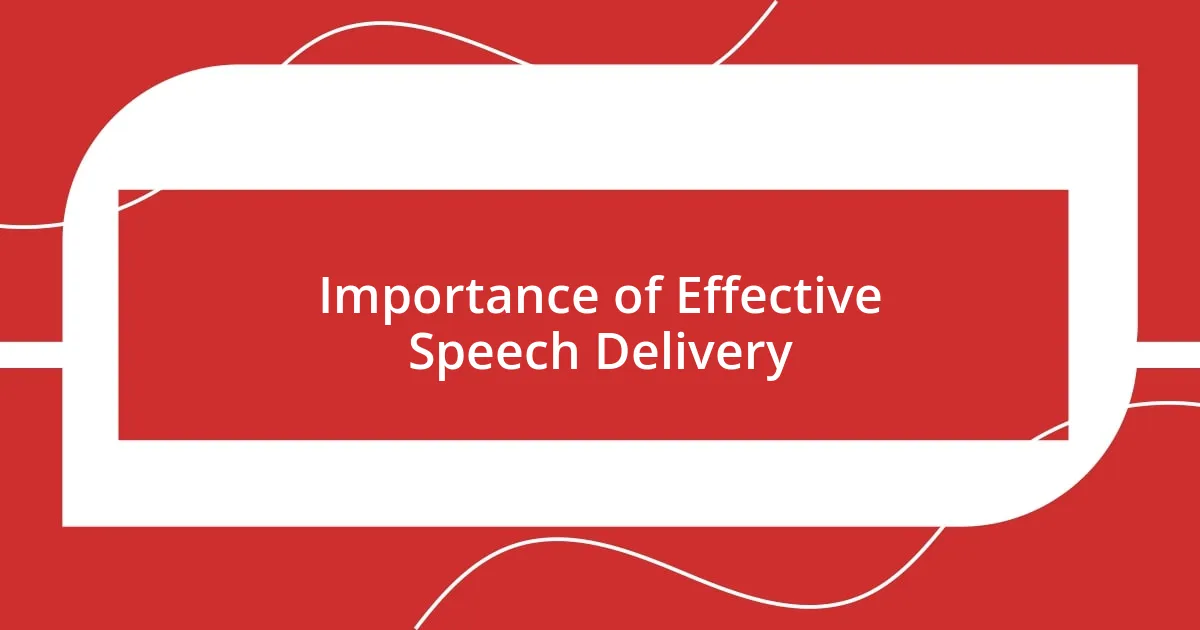
Importance of Effective Speech Delivery
Effective speech delivery is crucial in making a lasting impression during award shows. I’ve seen firsthand how the nuances of a speaker’s tone, pace, and body language can amplify their message or, conversely, diminish it. For instance, I once watched a prominent filmmaker whose voice trembled with emotion as they recounted their journey, captivating the audience and leaving a profound impact. It’s fascinating how delivery can elevate an ordinary message into something extraordinary.
- Engages the audience: A well-delivered speech keeps listeners focused and emotionally involved.
- Enhances clarity: Good delivery ensures the message is understood and retains its intended significance.
- Creates connection: Personal delivery styles can foster a bond between the speaker and the audience, making the moment feel more relatable.
- Inspires action: Effective speeches often lead to motivation and change, stirring viewers to think or act differently based on the speaker’s message.
I can’t help but think of speeches that literally changed the way I viewed certain issues, all because the delivery felt genuine and compelling. That ability to touch hearts and minds is what truly makes effective speech delivery indispensable in such prestigious settings.
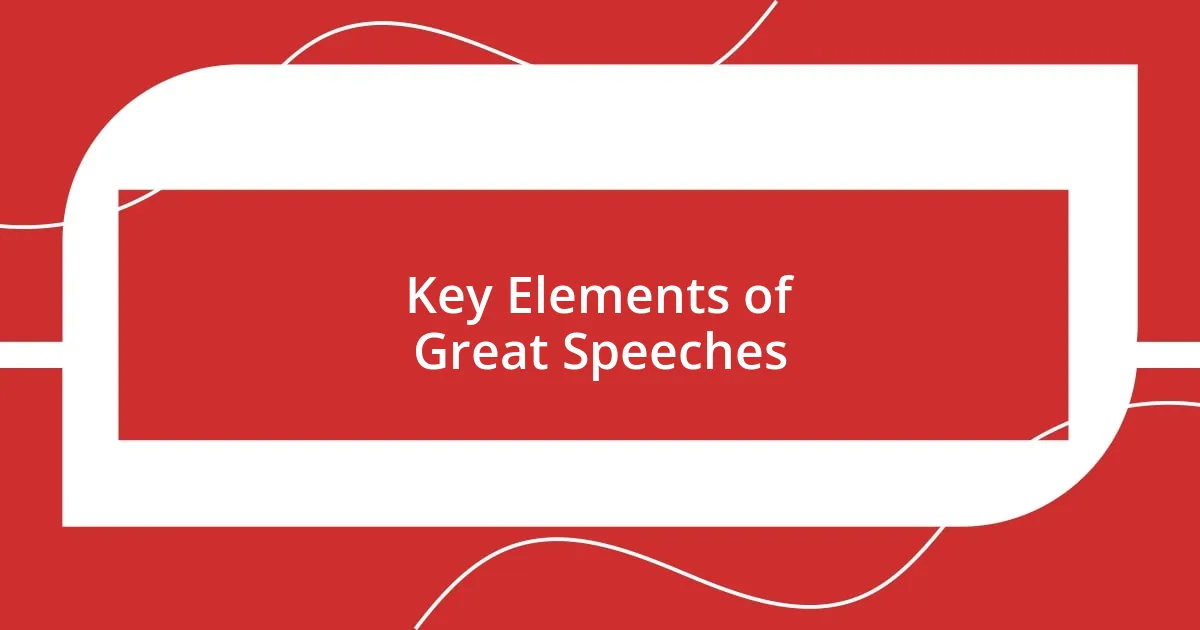
Key Elements of Great Speeches
Great speeches share key elements that make them memorable and impactful. One of the fundamental aspects is storytelling. I vividly recall a speech where a winner detailed their struggles and triumphs. The way they wove personal anecdotes into their message was so effective that it felt like I was on a journey with them. It reminded me of how, in my own experiences, sharing a personal story can create an immediate connection with the audience, making them feel invested in the narrative.
Another crucial element is authenticity. When a speaker is genuine, it resonates with the audience. I once listened to an artist who almost stumbled through their speech, clearly overwhelmed by emotion. Instead of detracting from their message, it made them more relatable. Their vulnerability allowed me to reflect on my own experiences with fear and triumph. Have you ever noticed how some of the best speeches come from a place of raw honesty? It’s that openness that often elicits the most powerful reactions.
Lastly, a strong opening and closing can turn a good speech into a great one. I think about how some winners start with a gripping quote or an unexpected statement, instantly grabbing attention. Then, by crafting a powerful conclusion that ties everything together, they leave the audience pondering long after the speech has ended. It’s a reminder of the importance of structure, which I’ve learned can elevate a message significantly.
| Key Element | Description |
|---|---|
| Storytelling | Engaging the audience with personal anecdotes to create connection. |
| Authenticity | Being genuine, which resonates deeply with listeners and fosters relatability. |
| Strong Opening/Closing | Capturing attention at the beginning and providing a memorable conclusion to enhance retention. |
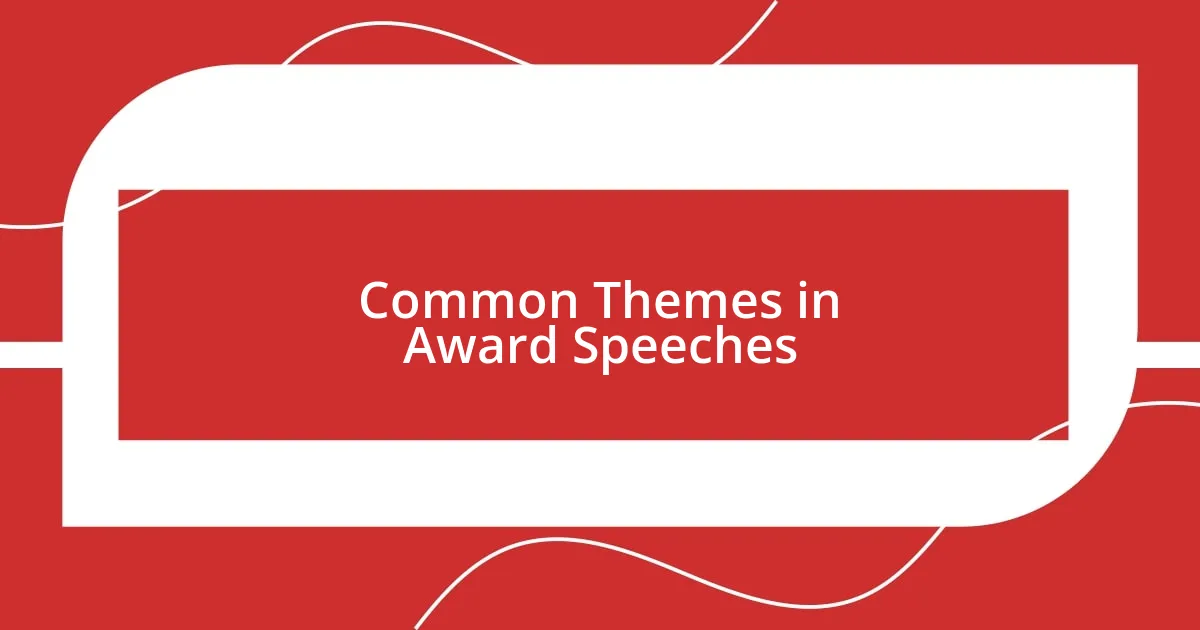
Common Themes in Award Speeches
One theme that often emerges in award speeches is gratitude. When winners take a moment to thank those who’ve supported them—be it family, mentors, or colleagues—they create a powerful emotional connection. I remember a particular speech where the recipient, nearly in tears, acknowledged his late grandfather, a significant influence in his life. The audience’s reaction was palpable; it felt like we were sharing in his tribute, making the moment even more poignant.
Another recurrent theme is resilience. Many speakers use their platform to highlight the importance of perseverance in the face of adversity. I’ve heard countless stories of individuals overcoming significant hurdles, which always inspires me. It raises a thought: how can we harness our challenges as motivation rather than obstacles? This idea seems to resonate deeply, reminding us all that success often comes after overcoming our greatest trials.
Lastly, many speeches emphasize the importance of community and collaboration. It’s striking how these messages highlight collective effort rather than individual accomplishment. I once listened to a group accept an award and emphasize that this was a team victory. I found myself reflecting on my own experiences of working together with others, realizing that shared successes often yield deeper satisfaction. Isn’t it fascinating how much more fulfilling achievements can feel when celebrated as a group?
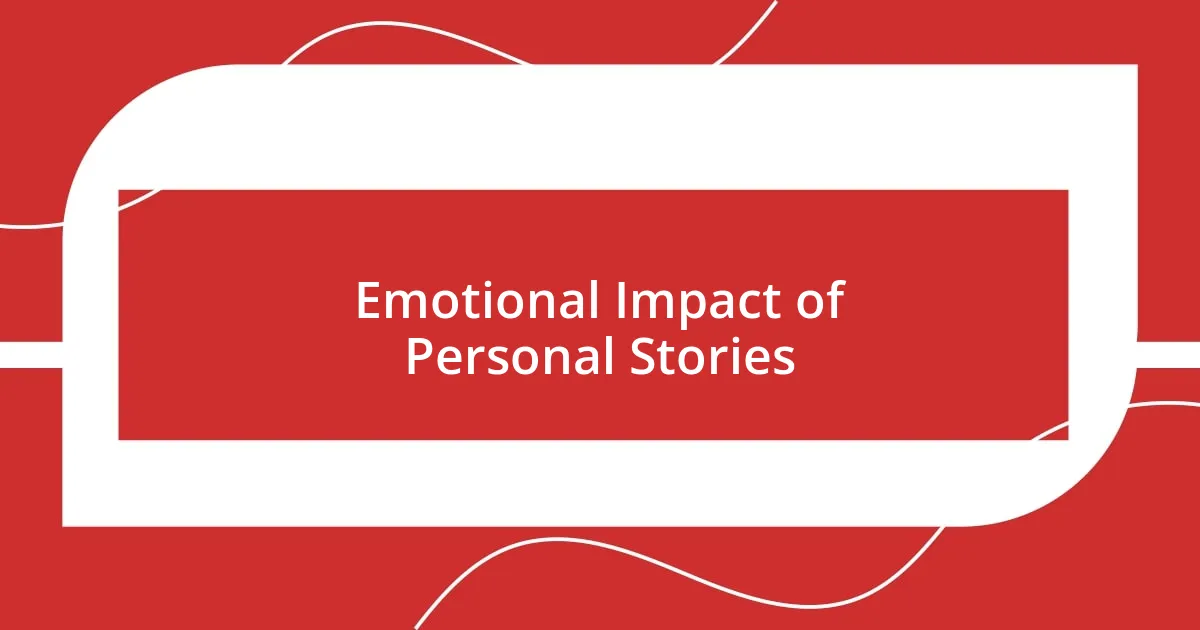
Emotional Impact of Personal Stories
Personal stories in award speeches have an uncanny ability to tap into our emotions. I still remember a speech from an actor who shared his journey from humble beginnings to stardom. As he recounted moments of despair and hope, I felt an emotional wave wash over the audience. It struck me then how sharing our struggles can ignite empathy and understanding, creating a shared space where listeners feel compelled to reflect on their own lives. Isn’t it interesting how a single story can turn a room full of strangers into a community?
The impact of vulnerability in personal storytelling is profound. For instance, during a recent awards ceremony, a winner shared her battle with anxiety and how it shaped her career. Her honesty was breathtaking; I could feel the weight of her words resonating in the hearts of those present. It made me ponder: when we expose our authentic selves, do we open doors for others to do the same? This profound connection, born from shared experiences, often leaves lasting impressions long after the applause fades.
On another note, I’ve observed how some of the most memorable speeches hinge on a pivotal moment in a speaker’s life. It could be a fleeting moment of kindness or an unexpected failure that became a turning point. I was deeply moved when a recipient spoke about how a simple act of solidarity from a stranger turned his life around. That heartfelt testament served as a reminder of the everyday miracles we often overlook. Don’t you think that such moments remind us that our stories, no matter how small, carry immense power to inspire others?
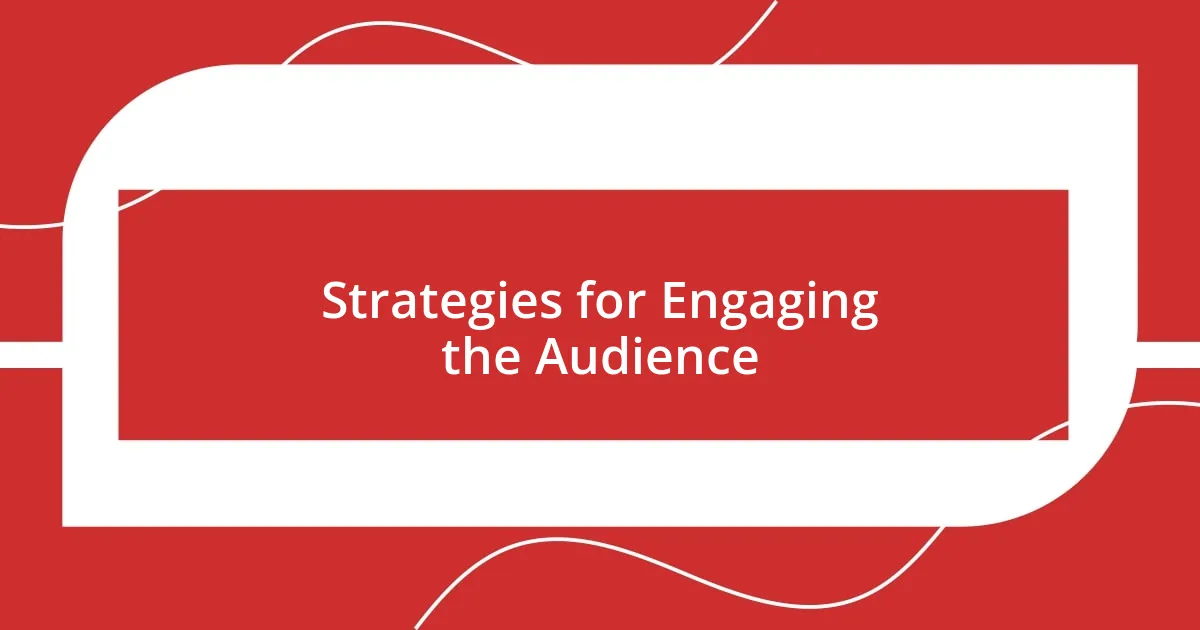
Strategies for Engaging the Audience
Engaging an audience during an award speech is all about authenticity. I recall a time when a recipient shared a humorous mishap from their early career that caught everyone off guard. The laughter was infectious, creating a relaxed atmosphere that made the audience feel more connected to the speaker. It’s moments like these that remind me just how powerful humor can be in disarming listeners and drawing them into a more intimate experience.
Another effective strategy is the use of rhetorical questions to provoke thought. I’ve seen speakers pose questions that linger in the minds of the audience long after the speech has ended. For example, one winner asked, “What would you attempt if you knew you couldn’t fail?” This simple yet profound question invited everyone to reflect on their own aspirations and fears, creating a shared moment of introspection. It made me think about the dreams I’ve sidelined and how powerful it can be to ask the right questions at the right moment.
Lastly, using visual aids can also boost audience engagement. I remember a presentation that included a short video highlighting the speaker’s journey, filled with candid moments of triumph and struggle. The room fell silent, captivated by the visuals that brought the story to life. I felt a surge of emotion as I watched, realizing how storytelling can transcend words when paired with impactful images. Isn’t it intriguing how a well-chosen visual can deepen our understanding and connection to a speaker’s message?
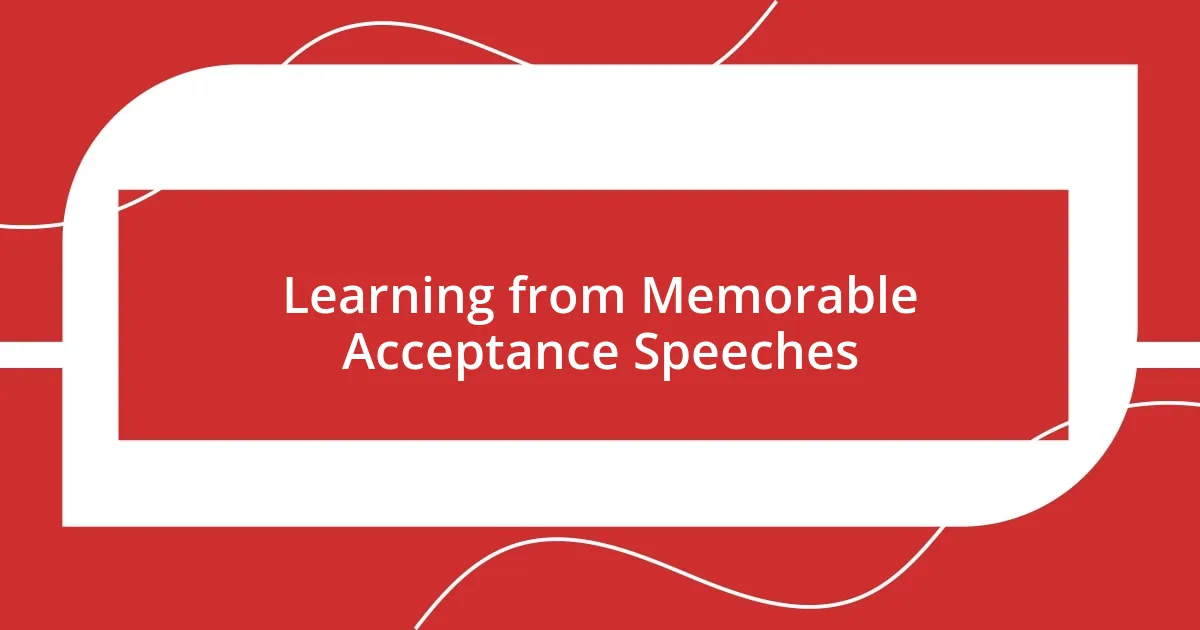
Learning from Memorable Acceptance Speeches
Learning from memorable acceptance speeches often reveals the power of gratitude. I once watched a filmmaker accept his award, and his heartfelt thanks to those who believed in him struck a chord with me. His words reminded me that acknowledging our supporters can create a ripple effect, encouraging others to express their appreciation too. Have you ever thought about how a simple “thank you” can strengthen our relationships?
The best acceptance speeches also showcase resilience, a theme I deeply resonate with. I recall a musician who spoke candidly about the years of rejection she faced before her breakthrough. Listening to her recount those challenging times made me reflect on my own hurdles. Isn’t it fascinating how sharing our failures can foster a sense of solidarity? We’re all on this journey together, learning and growing from each setback.
Finally, memorable speeches often tie back to a larger purpose or cause, adding depth to the personal narrative. I remember a technical innovator discussing how her invention aimed to address climate change. Her passion ignited inspiration in the audience, prompting many of us to consider our impact on the planet. It made me wonder: how can we align our personal achievements with a greater mission? Recognizing this connection can transform achievements into legacies that resonate beyond the stage.










